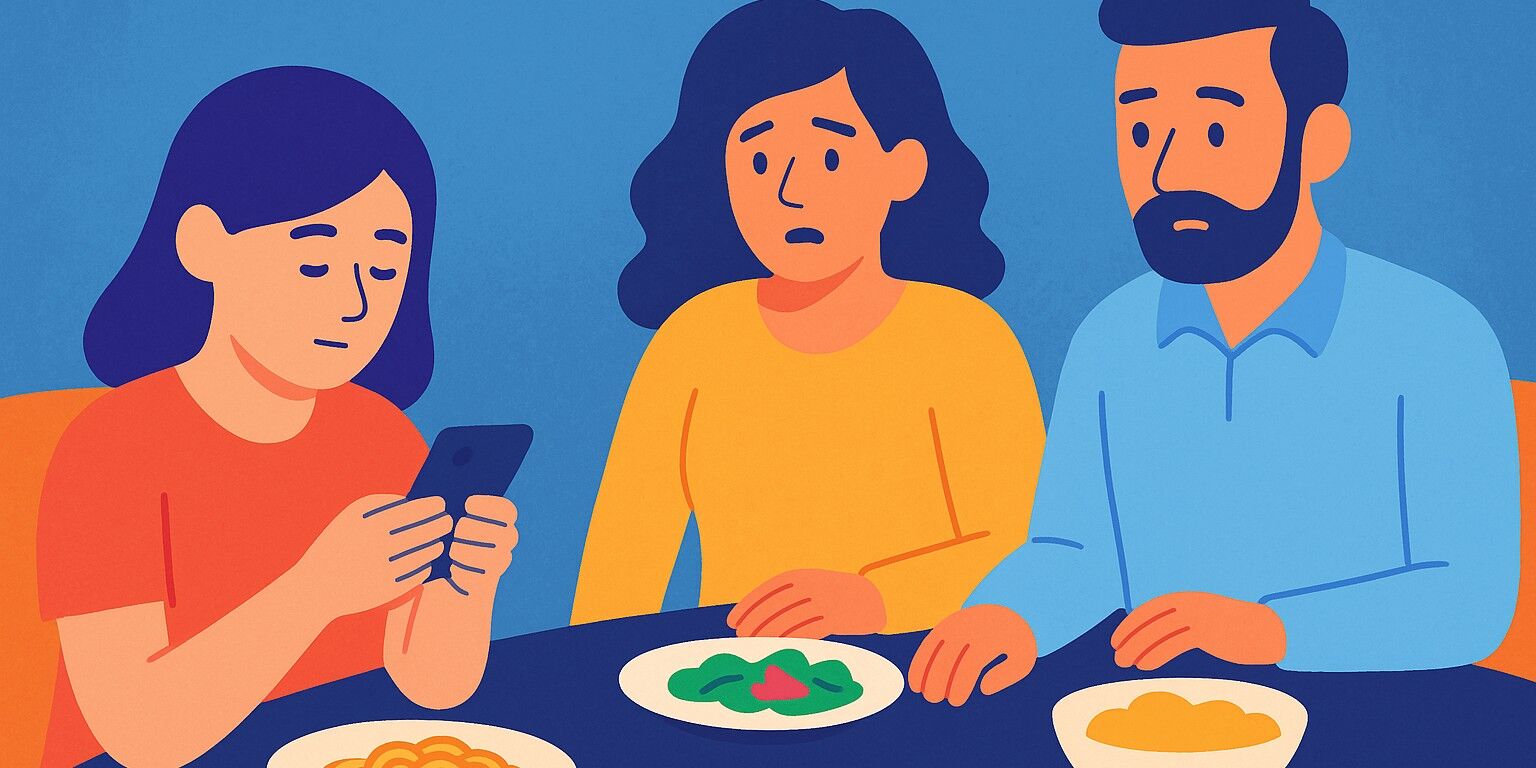If your teen seems permanently attached to a phone at the dinner table, you’re not alone. Parents everywhere joke about being “addicted to the scroll,” but new research from the University of Georgia suggests it’s more than a punchline. Two long-term studies by UGA’s College of Family and Consumer Sciences found that introducing smartphones early can hurt family relationships and even affect teen mental health. The data show it’s not just screen time; it’s when and how those screens enter your child’s life.
Researchers analysed more than 11,000 families with children starting at age nine and tracked them for a decade. By age 11, kids who used smartphones experienced more conflict with parents—arguments, nagging and criticism—and those disagreements followed them through the teen years. Social media was a major culprit. As kids start comparing themselves to peers online, especially young girls, fights over screen use became more frequent, while video games and streaming clips didn’t appear to cause the same friction. Cory Carvalho, lead author of one study, notes that kids are getting phones around age 10 and that age is creeping downward. When their still-developing brains collide with the emotional rollercoaster of social media, sparks fly.
The second study looked at how screens affect emotional connection. It found that electronic media use can isolate teens during times of emotional turbulence, making them less likely to confide in parents. The earlier a child owns a smartphone, the less aware parents may be if that child is anxious or depressed. Assistant professor Niyantri Ravindran warns that early phone ownership creates gaps in parent-child communication—teens internalise problems and stop seeking support. That silence can allow anxiety and depression to grow unchecked.
So what’s a modern parent to do? The researchers aren’t suggesting you throw every gadget out the window. Instead, they recommend delaying smartphone ownership until children are older and placing limits on screen time. Set clear, consistent boundaries on when phones are used—maybe a “no phones at dinner” rule or a family tech curfew. Make sure kids know the rules apply to adults, too; nothing undermines a boundary like a parent secretly scrolling under the table. Most importantly, prioritise face-to-face connection: cook together, walk the dog, or just sit and chat without screens buzzing. When conflicts arise, remember that your tween’s brain is still learning to regulate big emotions. A little humour and a lot of patience go a long way.
Early smartphones may bring family drama, but they also offer an opportunity. By setting boundaries and staying present, parents can teach kids how to enjoy technology without letting it take over. Dinner may not be phone-free every night, but if we model balance and honesty, our teens might just lift their heads up and talk to us again.
Sources: UGA Today – “Youth screen use can cause family conflict, exacerbate mental health problems”.
الهواتف على مائدة العشاء؟ كيف تُشعل الهواتف الذكية المبكرة الخلافات الأسرية وتُسكت المراهقين
لو ابنك أو بنتك ماسكين الموبايل طول الوقت أثناء الأكل فأنت مش لوحدك. كلنا بنهزر ونقول إنهم “مدمنين السوشيال”، لكن أبحاث جديدة من جامعة جورجيا بتقول إن الموضوع أكبر من هزار. دراستين طويلة المدى من كلية العلوم الأسرية والاستهلاكية في الجامعة دي بتشير إن إدخال الهواتف الذكية في سن صغير ممكن يضر علاقات العيلة ويأثر على الصحة النفسية للمراهقين. المسألة مش بس عدد الساعات قد ما هي توقيت وكيفية دخول الموبايل لحياة ابنك.
الباحثين تابعوا أكتر من 11 ألف أسرة ابتداءً من سن 9 سنوات ولمدة عشر سنين. بحلول سن 11، الأولاد اللي استخدموا الهواتف كانوا بيتخانقوا مع أهاليهم أكثر—مشاحنات وزعيق وانتقادات مستمرة—والسلوك ده استمر معاهم في سن المراهقة. السوشيال ميديا كانت سبب أساسي؛ البنات الصغيرين خصوصاً لما يقارنوا نفسهم بزملائهم على الإنترنت بتزيد المشاكل، في حين إن ألعاب الفيديو ومشاهدة المقاطع مش بتعمل نفس التأثير. الباحث كوري كارفايو بيقول إن الأطفال بيحصلوا على الهواتف حوالى سن 10 والسن ده في انخفاض. عقولهم لسه بتتطور وبيتعرضوا لعالم السوشيال، فبتولع شرارة الخلافات.
الدراسة التانية ركزت على تأثير الشاشات على التواصل العاطفي. وجدوا إن استخدام الوسائط الإلكترونية ممكن يعزل المراهقين في أوقات الاضطراب العاطفي ويخليهم أقل استعداداً إنهم يفضفضوا لأهلهم. كل ما الطفل يمتلك تليفون ذكي في سن أصغر، كل ما الأهل مش بياخدوا بالهم لو عنده قلق أو اكتئاب. الدكتورة نيانتري رافيندران بتحذر إن امتلاك الموبايل بدري بيخلق فجوة في التواصل بين الآباء والأبناء—المراهقين بيكتموا مشاكلهم وبيبطلوا يلجؤوا للدعم. السكوت ده ممكن يخلي القلق والاكتئاب يزيدوا من غير ما حد يحس.
طيب نعمل إيه؟ الباحثين مش بيقولوا ارمي الأجهزة في الزبالة، لكن بينصحوك إنك تأجل الموبايل لحد ما الأولاد يكبروا وتحط حدود لاستخدام الشاشات. حط قواعد واضحة وثابتة زي “ممنوع الموبايلات على السفرة” أو “حظر تقني” عائلي قبل النوم. واتأكد إن الكبار بينفذوا القواعد كمان؛ مفيش حاجة بتفشل الحدود زي أب أو أم بيبص في تليفونه من تحت الترابيزة. والأهم، خصصوا وقت للكلام وجهًا لوجه؛ اطبخوا سوا، اتمشوا مع الكلب أو اقعدوا تدردشوا من غير إزعاج الشاشات. لما يحصل شد وجذب، افتكر إن دماغ ابنك لسه بيتعلم يتحكم في مشاعره. شوية خفة دم وصبر هيحلوا كتير.
الهواتف المبكرة ممكن تجيب دراما للعيلة، لكنها فرصة برضه. لما نحط حدود ونكون حاضرين، هنعلّم أولادنا إزاي يستمتعوا بالتكنولوجيا من غير ما تسيطر عليهم. مش لازم العشاء يكون من غير هواتف كل ليلة، لكن لو قدّمنا مثالاً للتوازن والصدق، يمكن المراهقين يبصوا لنا ويتكلموا من جديد.
المصادر: UGA Today – “Youth screen use can cause family conflict, exacerbate mental health problems”.







Leave a Reply
You must be logged in to post a comment.